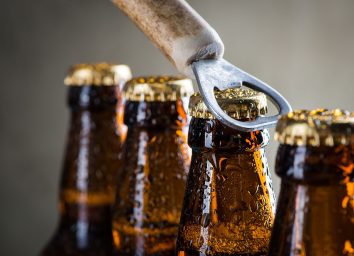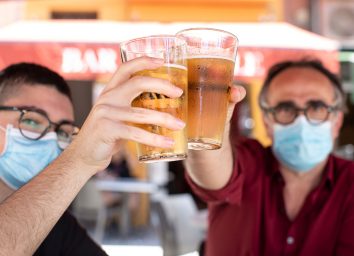Surprising Side Effects Alcohol Has on Your Gut

Most of us are familiar with that bloating feeling from drinking too many beers at the ballpark, along with peanuts and Crackerjacks (and hot dogs). And how many of us have spent the morning on the toilet after having one too many drinks the night before?
Alcohol affects every part of your body, but do you know why drinking can trigger so many negative outcomes in the gut, specifically?
Let’s take a few sips and find out. And for more tips on how to eat healthy, don’t miss 7 Healthiest Foods to Eat Right Now.
GERD

Alcohol affects the entire gastrointestinal tract—from the mouth to the esophagus to the stomach—and in some not-so-pleasant ways. As soon as you take a mouthful of that craft beer or strawberry daiquiri, the alcohol starts to impair the function of the muscles that separate the esophagus and the stomach. This can cause reflux esophagitis, commonly known as heartburn, where stomach acids back up into the esophagus. The condition is also called GERD, or gastroesophageal reflux disease. A 2018 study in the journal Gastroenterology noted that drinking alcohol in early adulthood likely leads to reflux disease. Interestingly, wine consumption seemed to have a protective effect, reducing the risk of esophageal disorders, the researchers found.
To learn more about heartburn and GERD triggers, read Foods Proven to Do Bad Things to Your Stomach, According to Doctors.
Mucosal trauma and cancer.
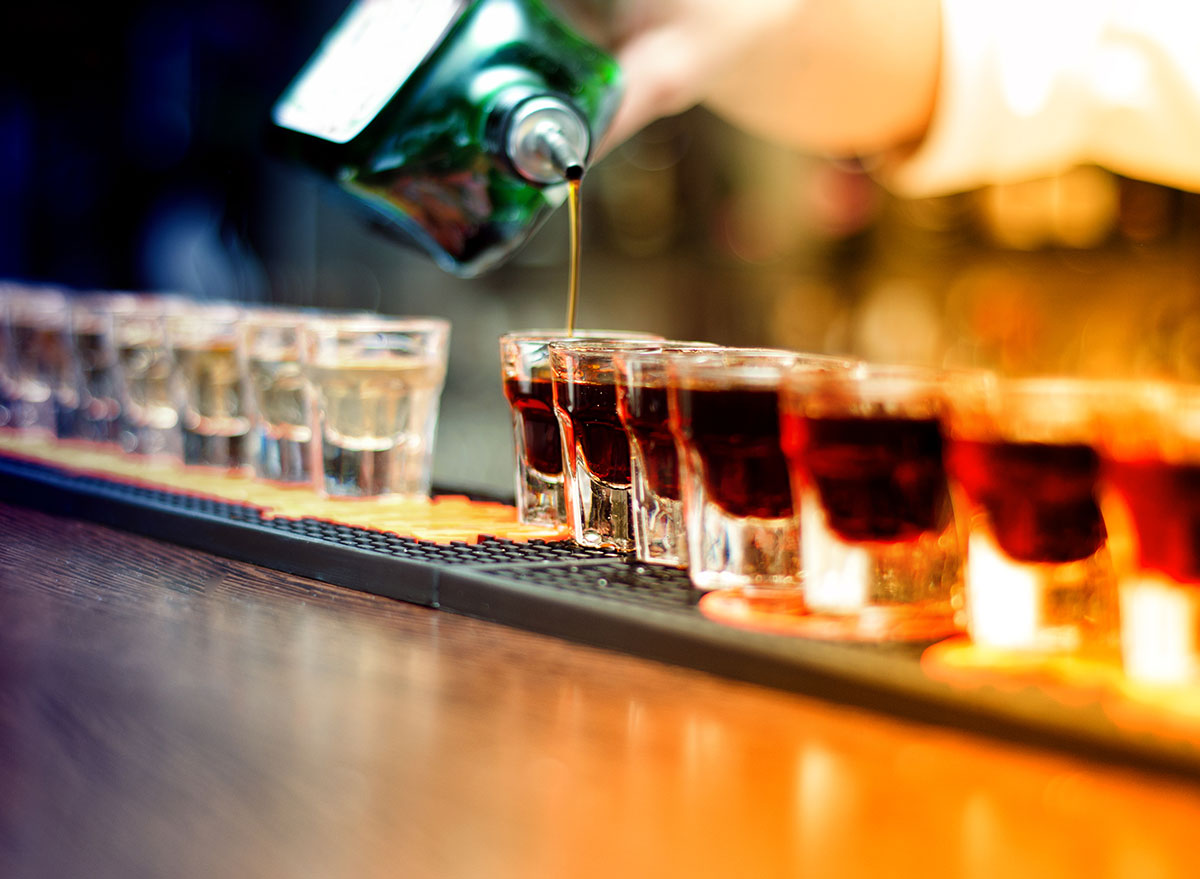
High alcohol consumption can harm the esophagus (the tube that runs from the throat to the stomach) in other ways. For example, it can cause damage to the delicate mucosal lining of the esophagus, which can increase the risk of esophageal cancer. The more alcohol you drink, the higher your risk for developing cancer of the esophagus, particularly squamous cell carcinoma, the most prevalent esophageal cancer affecting primarily the upper and middle parts of the esophagus, according to the American Cancer Society (ACS).
Gastritis and Peptic Ulcers

Do you notice a burning ache or feeling of extreme fullness in your upper abdomen after eating? That’s indigestion or dyspepsia, what doctors call gastritis. “The lining of the stomach becomes irritated and inflamed, often caused by drinking too much alcohol,” says nutritionist Julie Miller Jones, PhD, emeritus professor of nutrition at St. Catherine University and a member of the Grain Foods Foundation’s Scientific Advisory Board. “Since the lining thins with age, this disorder is more common in older people.”
Alcoholic gastritis is most associated with drinking hard liquors, such as whiskey, gin, and vodka. When there’s a break in the inner lining of the stomach or even in the upper intestine or lower esophagus, it’s called a peptic ulcer. Symptoms include burning pain or a dull ache, belching, vomiting, and weight loss. For more, read The Biggest Danger Sign You’re Drinking Too Much Alcohol, Say Doctors.
Inflammatory Bowel Syndrome (IBS)

The small intestine isn’t very good at processing certain types of carbohydrates dubbed FODMAPs for fermentable oligosaccharides, disaccharides, monosaccharides, and polyols. Some people just can’t absorb those carbs, which pull more fluid into the bowel and create more gas as the bacteria in the colon are fermented by them. The result is gas, bloating, pain, and diarrhea.
The worst alcoholic beverages for IBS include those with the most FODMAPs: high-sugar drinks like sweet dessert wines, port, sherry, rum, and ciders. Cocktails made with mixers containing high-fructose corn syrup, artificial sweeteners, and carbonation can also trigger IBS symptoms. Studies show that following a low-FODMAP diet and reducing or eliminating alcohol can relieve IBS symptoms. A 2019 study in Nutrients, for example, found that 85% and 87% of patients following a low-FODMAP diet reported less abdominal pain and flatulence, respectively, compared to just 61% and 50% on a standard diet.
Constipation or diarrhea.

Yes, both can happen from drinking. What happens when you drink a few beers? You pee more often. That’s because alcohol prevents your body from releasing a hormone responsible for fluid retention. When you pee more, you become dehydrated, which can cause constipation. As for the runs, high-alcohol drinks “may impair the muscle movement in the small and large intestines, contributing to the diarrhea frequently observed in alcoholics,” writes Christiane Bode, PhD, and J Christian Bode, MD, in the NIH publication Alcohol Health & Research World.
Inflammatory diseases.
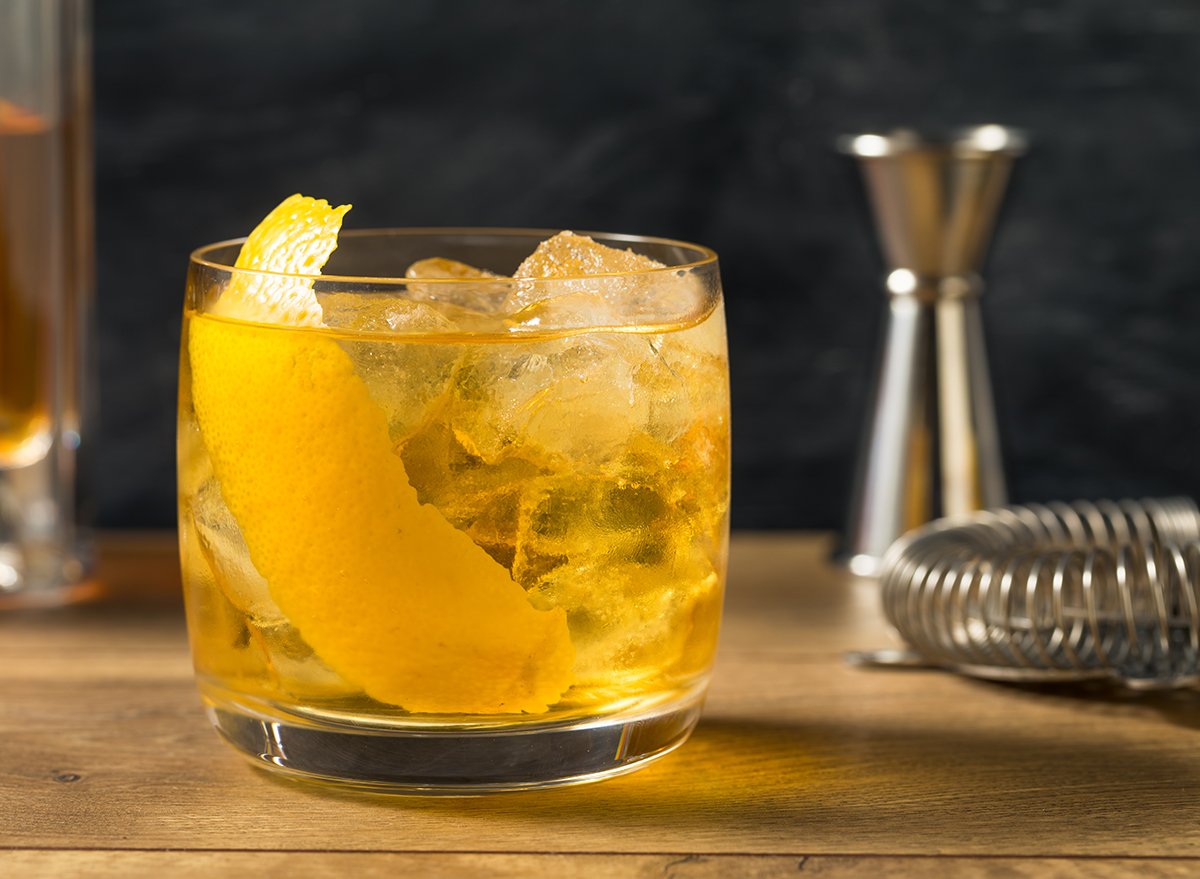
Poor gastrointestinal health is increasingly being linked to poor overall health, including chronic organ diseases like liver disease, neurological disorders, GI cancers, and inflammatory bowel syndrome. Research has also shown that regular consumption of alcohol in large quantities starts a process in the gut that promotes inflammation throughout the body, according to a study in a 2015 issue of Biomolecules.
Unhealthy gut microbiota.

The gut contains more than 500 bacterial species—both good and bad pathogenic bacteria. A healthy gut maintains a balance of good and bad bacterial homeostasis. But a chronic state of intestinal inflammation causes changes in the microbiota composition that can lead to increased permeability of the intestinal mucosa, according to a 2017 paper in Alcohol Research Current Reviews. That’s the “leaky gut” syndrome you may have heard about. When that happens, key nutrients from your food are not absorbed properly and the epithelial layer of the intestinal wall becomes permeable, allowing undigested food particles and pathogens into the bloodstream where they can infiltrate other organs. Human studies have demonstrated that alcoholics with increased gut permeability are more likely to have liver disease, which can lead to cirrhosis and liver cancer.
Vitamin and mineral deficiency.
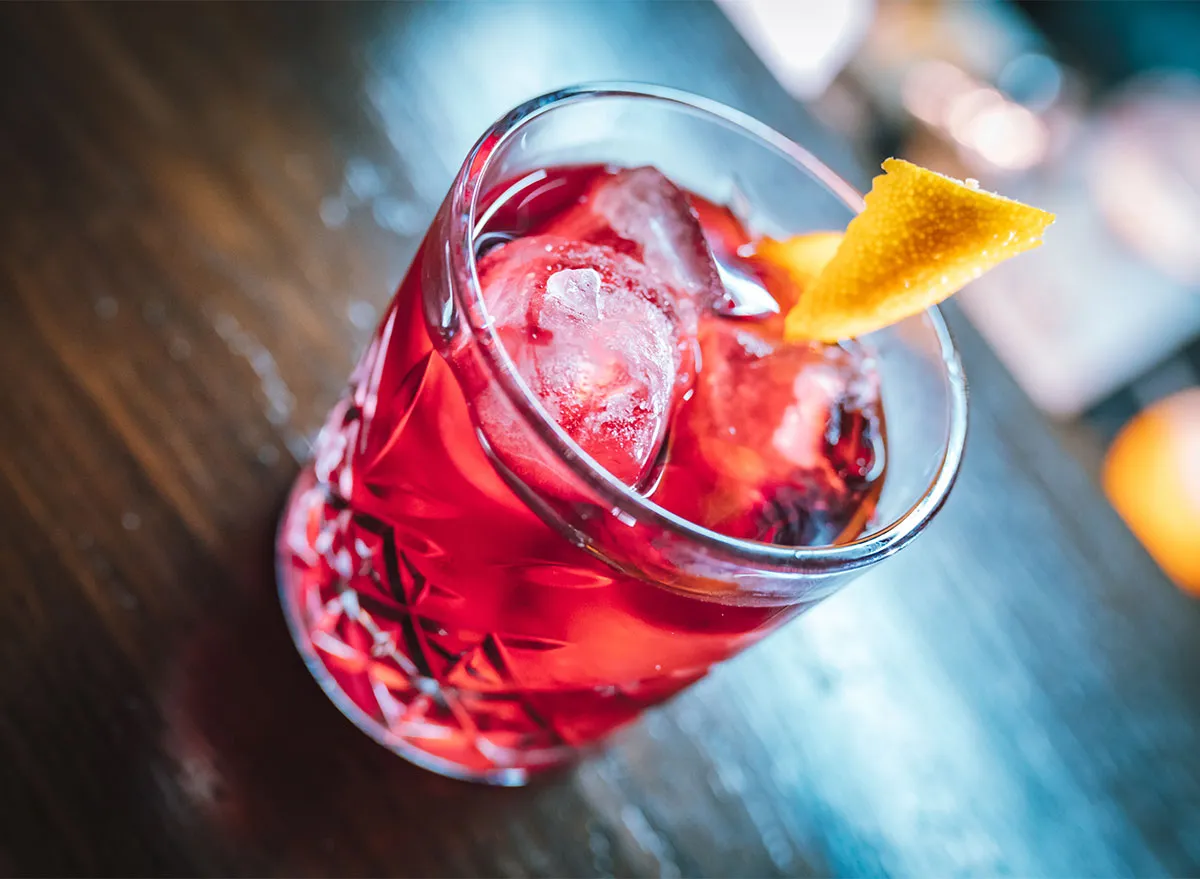
Another side effect of drinking alcohol that you may find surprising is the potential for deficiencies in certain vitamins like vitamin D and minerals like zinc. Alcoholics are often deficient in both. Whether that’s caused by high alcohol consumption or a poor diet isn’t fully understood, but rodent studies have found a relationship between zinc deficiency and alcohol-induced gut leakiness.
Reduced immune system function.

Many researchers agree that drinking alcohol can suppress the immune system, impairing the body’s ability to fend off infections. After all, the GI system plays a critical role in immune homeostasis. One study in the journal Alcohol demonstrated the result of a bout of binge drinking by testing the blood of volunteers at different time periods following shots of high-dose alcohol. At two and five hours after consumption, the blood test showed a marked reduction in the number of monocytes, the white blood cells that fight off viruses and bacteria.
And, of course, your gut may grow.

You’re probably not surprised to learn that alcoholic beverages can be high in calories: A five-ounce white Russian has 225 calories, while a typical craft IPA beer has between 200 and 280. Having a few, which is easy to do, can add up to more than a meal’s worth of calories, without actually eating any food. Alcohol can also trigger hunger signals in your brain, and studies do connect alcohol consumption to obesity. One way drinking can result in weight gain in your gut: Your body prioritizes alcohol as fuel. When you drink, the alcohol is burned first, elbowing out glucose from carbohydrates or fats, which are stored as adipose (fat) tissue if not used—especially in your belly.

